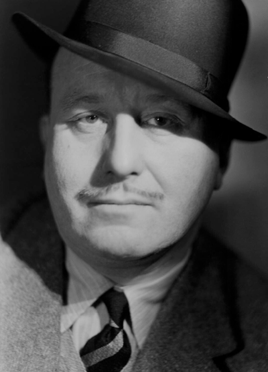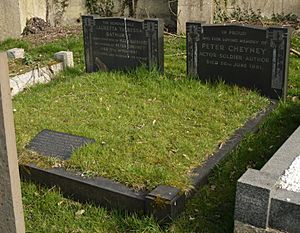Peter Cheyney facts for kids
Quick facts for kids
Peter Cheyney
|
|
|---|---|

Peter Cheyney in 1938
|
|
| Born | 22 February 1896 London, UK |
| Died | 26 June 1951 (aged 55) London, UK |
| Occupation | Policeman and novelist |
| Nationality | British |
| Period | 1925–1951 |
| Genre | Crime |
Peter Cheyney (born Reginald Evelyn Peter Southouse-Cheyney on February 22, 1896 – died June 26, 1951) was a British writer of crime fiction. He was very popular from 1936 to 1951.
Cheyney is famous for his short stories and novels about a secret agent and detective named Lemmy Caution. These stories were made into a series of French movies starting in 1953. Another well-known character he created was the private detective Slim Callaghan. His books were also turned into films.
Even though his books haven't been printed for many years, you can still find them used. Some of his novels are now available as e-books.
Contents
Early Life and First Steps in Writing
Peter Cheyney was born in Whitechapel, London, in 1896. He was the youngest of five children. He went to Mercers' School in the City of London. As a teenager, he started writing short plays for the theater.
His writing stopped when World War I began. In 1915, he joined the British Army. He was hurt in 1916 and published two books of poems: Poems of Love and War and To Corona and Other Poems. He finished his military service in 1917.
In the late 1920s, Cheyney worked for the Metropolitan Police as a reporter and crime investigator. He was often quite poor before he became a successful crime novelist. It's said that he started writing because of a bet. Cheyney once said that anyone could write a book like an American thriller. Someone bet him five pounds that he couldn't. Cheyney sold his first story because of this bet.
Peter Cheyney's Writing Career
Cheyney wrote his first novel, This Man Is Dangerous, in 1936. It was a thriller about Lemmy Caution. Then, in 1938, he wrote the first Slim Callaghan novel, The Urgent Hangman. These two books were very successful right away. This success helped him start a new career as a writer. Cheyney stopped working as a freelance investigator. His books sold very well; in 1946 alone, over 1.5 million copies were sold around the world.
Cheyney was very careful with his research. He kept many files about crimes in London. Sadly, these files were destroyed during the Blitz in 1941. But he soon started collecting new information. He would dictate his stories, meaning he would "act out" his stories for his secretary, Miss Sprauge. She would write them down and type them later.
Lemmy Caution and Slim Callaghan
The Lemmy Caution books often sound like American pulp stories, even though a British writer wrote them. But with his private detective Slim Callaghan, Cheyney created a character who was not American. Callaghan was based in Cheyney's home city of London.
In the first book, Callaghan works from a small office in Chancery Lane and struggles to pay his bills. But he is ambitious. After helping a rich female client, he is able to open his own detective agency. He gets a fancy office and a pretty secretary in the stylish Berkeley Square area.
Later novels in the Slim Callaghan series often follow a similar pattern. A rich and attractive woman asks Callaghan for help. She is usually involved in a problem, like blackmail, that she can't report to the police. Callaghan meets the woman and likes what he sees. Cheyney often described the ladies' clothes and jewelry in detail. Callaghan acts cool and a bit cheeky, which both annoys and attracts the woman. The woman is often afraid to tell him everything or is hiding facts. Callaghan has to figure out the truth himself.
Callaghan starts his investigation by looking around and causing a bit of trouble. This gets the attention of others involved in the mystery. They give him enough clues to understand the whole situation and plan his next moves.
During these cases, which usually last a few days, Callaghan pushes himself hard. He often doesn't sleep, drinks a lot of whisky, and drives his Jaguar long distances, sometimes all in the same night.
The Dark Series
Cheyney's "Dark" series of books was praised during World War II. These books brought more realism to spy stories. They showed a rougher side of espionage.
Cheyney also published a book of short stories, advice for critics, and some poems in No Ordinary Cheyney (1948).
He passed away at age 55 after falling into a coma. He was buried at Putney Vale Cemetery in London.
Peter Cheyney's Personal Life
Many people said that Cheyney lived a life similar to his characters. He worked very hard and lived a fast, carefree life. This way of living eventually caught up with him. Besides being a great writer, he was also a skilled fencer, a golfer, a very good pistol-shot, and knew jiu-jitsu.
He was married three times. His first marriage was in 1919 to actress Dorma Leigh, but they divorced in 1931. In 1934, he married Kathleen Nora Walter Taberer. His third marriage was in 1948 to Lauretta Theresa Singer. He did not have any children.
List of Works
Lemmy Caution Novels
- This Man Is Dangerous (1936) – made into a film in 1953
- Poison Ivy (1937) – made into a film in 1953
- Dames Don't Care (1937) – made into a film in 1954
- Can Ladies Kill? (1938)
- Don't Get Me Wrong (1939) – made into a film in 1955
- You'd Be Surprised (1940)
- Your Deal, My Lovely (1941) – made into a film in 1963
- Never a Dull Moment (1942)
- You Can Always Duck (1943)
- I'll Say She Does! (1945) – made into a film in 1960
- G-Man at the Yard (1946)
Slim Callaghan Novels
- The Urgent Hangman (1938) – made into a film in 1954
- Dangerous Curves (1939), also called Callaghan in the US
- You Can't Keep the Change (1940)
- It Couldn't Matter Less (1941), also called Set-up for Murder in the US – made into a film in 1955
- Sorry You've Been Troubled (1942), also called Farewell to the Admiral in the US – made into a film in 1955
- They Never Say When (1944)
- Uneasy Terms (1946) – made into a film in 1948
- Calling Mr. Callaghan (1953) – a collection of short stories
Dark Series Novels
This is a group of novels with different main characters:
- Dark Duet (1942), also called The Counterspy Murders
- The Stars Are Dark (1943), also called The London Spy Murders
- The Dark Street (1944), also called The Dark Street Murders
- Sinister Errand (1945), also called Sinister Murders – made into a film in 1952
- Dark Hero (1946), also called The Case of the Dark Hero
- Dark Interlude (1947), also called The Terrible Night
- Dark Wanton (1948), also called Case of the Dark Wanton
- You Can Call It a Day (1949), also called The Man Nobody Saw
- Dark Bahama (1950), also called I'll Bring Her Back
- Lady, Behave! (1950), also called Lady Beware
- Ladies Won't Wait (1951), also called Cocktails and the Killer
Other Novels
- Another Little Drink (1940), also called Premeditated Murder and A Trap for Bellamy
- Night Club (1945), also called Dressed to Kill
- Dance Without Music (1947)
- Try Anything Twice (1948)
- One of Those Things (1949), also called Mistress Murder
Short Story Collections
- You Can't Hit a Woman (1937)
- Knave Takes Queen (1939; a bigger edition came out in 1950)
- Mr. Caution – Mr. Callaghan (1941)
- Making Crime Pay (1944), a collection of stories, articles, and radio plays
- The Curiosity of Etienne MacGregor (1947), also called The Sweetheart of the Razors
- No Ordinary Cheyney (1948)
- Velvet Johnnie (1952)
- The Adventures of Julia (1954), also called The Killing Game in the US
- He Walked in Her Sleep (1954), also called MacTavish
- The Mystery Blues (1954), also called Fast Work
Uncollected Short Stories
- The Snow Lady. Morecambe Guardian, March 21, 1930 (Alonso Mactavish)
- The Snow Man. Hastings & St Leonards Observer, December 27, 1930 (Alonso Mactavish)
- Angel Unawares. Sheffield Daily Independent Christmas Budget, December 19, 1936
- Bread upon the Waters. Rugby Advertiser, February 18, 1938
About Peter Cheyney
A book about Cheyney's life, Peter Cheyney: Prince of Hokum, was written by Michael Harrison in 1954.
Cheyney also published a book that was partly about his own life, called Making Crime Pay. After he died, two essays about his life appeared in other books. One essay, "Peter Cheyney" by Viola Garvin, is in Velvet Johnnie (1952). Another essay is in the collection Calling Mr. Callaghan (1953).
See also
 In Spanish: Peter Cheyney para niños
In Spanish: Peter Cheyney para niños
 | Victor J. Glover |
 | Yvonne Cagle |
 | Jeanette Epps |
 | Bernard A. Harris Jr. |


